News
Grenell emails reveal internal talk on Trump era policy against Pride flag
U.S. embassies barred from rainbow flag on official poles
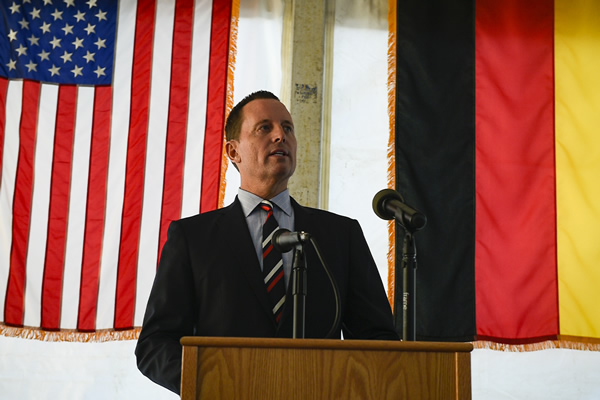
The latest emails from the State Department obtained by the Washington Blade via its lawsuit under the Freedom of Information Act reveal internal deliberation in the Trump administration over news reports about the prohibition of displaying Pride flags on the official pole at U.S. embassies.
Former U.S. Ambassador Richard Grenell, whose emails the Blade is seeking as the public face of a global initiative that pledged to decriminalize homosexuality, is repeatedly shown in the communications instructing his aides at the embassy in Berlin to give no comment to the media, including in response to an inquiry at the time from the Blade, on the flag policy for embassies.
“Thanks. Say nothing. I’m working it internally,” Grenell responds in an email chain after being updated on the latest media inquiries, which included requests from ABC’s Conor Finnegan, the Huffington Post, Buzzfeed, and CBS.
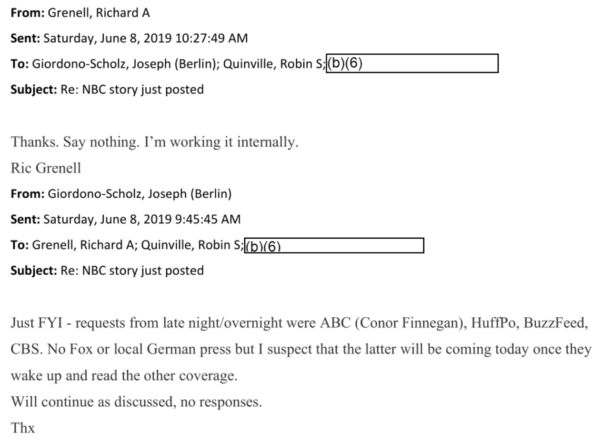
It’s unclear what, if anything, Grenell was doing as part of “working it internally” as news broke that embassies were barred from flying Pride flags on the official pole, or even whether he was seeking a substantive change as opposed to crafting talking points to mitigate the appearance of the Trump administration being anti-LGBTQ.
“No Fox or local German press but I suspect that the latter will be coming today once they wake up and read other coverage,” writes Joseph Giordono-Scholz, who was handling media relations for the embassy. “Will continue as discussed, no responses.”
In 2019, shortly after Grenell announced he’d spearhead a global initiative to decriminalize homosexuality on behalf of the Trump administration, U.S. embassies that had sought to raise the rainbow flag in recognition of June as Pride month were barred from doing so under guidance from the State Department.
Critics at the time jumped on the policy as further evidence the Trump administration was anti-LGBTQ, despite having recently launched the decriminalization initiative. Trump defenders pointed out the prohibition was limited to the official pole, was a general ban of flying any flag other than the U.S. flag, and embassies found other ways to display the Pride flag on their grounds.
Grenell didn’t respond Tuesday to the Blade’s request for comment on the meaning of “working it internally,” but Log Cabin Republicans, an organization close to Grenell, volunteered a message shortly after the Blade sent its inquiry to him.
Charles Moran, managing director of Log Cabin Republicans, said in the email the conception the Trump administration banned Pride flags at embassies is erroneous.
“We were very pleased that President Trump made it clear that pride flags could continue to be flown at embassies around the globe, despite logistical discussions internally being had at the State Department,” Moran said.
Attached in the email is an image of Moran standing below a pole with both a U.S. flag and a rainbow flag, which Moran said was taken at the U.S. Embassy Berlin on July 26, 2019, when he was en route to a decriminalization discussion forum being hosted there.
Asked by the Blade whether that was the official pole, Moran replied, “I don’t know what an ‘official pole’ is. It was a professionally installed flag pole, on the embassy next to the front door.” Moran didn’t respond to an additional follow up question on what he meant by Trump making it clear Pride flags would be allowed at embassies.
Morgan Ortagus, then-spokesperson for the State Department, defended former Secretary of State Mike Pompeo’s policy against Pride flags on as she acknowledged “Pride Month that we’re in right now celebrated around the world by many State Department employees, by many embassies.”
“The secretary has the position that, as it related to the flag pole, that only the American flag should be flown there,” Ortagus said.
The email chain within the U.S. embassy in Berlin on the news development began with Giordono-Scholz forwarding Grenell a link to a story from NBC News’s Josh Lederman, who broke the story on U.S. embassies being unable to fly Pride flags, followed by a subsequent email with the text of his article. The immediacy with which the aide sends the link in an email first before the story itself in a subsequent message suggests a sense of urgency in distribution and awareness the article would be forthcoming.
Other news outlets were quick to follow up, including the Blade, as evidenced by Giordono-Scholz’s follow up question to Grenell after sharing the initial NBC News story.
“CNN (Michelle Kosinski) just called, asked if we had anything to add,” Giordono-Scholz writes. “Wash Blade also just emailed. How would like me to respond to these and coming inquiries — just point them to the NBC statement you gave and refer back to DC on questions about the Dept?”
Grenell was succinct in response: “Say nothing. Right now don’t respond.”
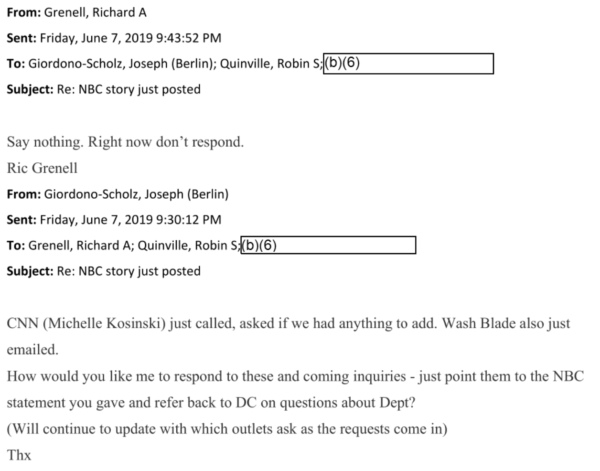
Giordono-Scholz acknowledges the instructions from Grenell in a subsequent email, which also notifies him of an inquiry from the Washington Post’s Carol Morello.
“Will continue to let you know about inquires but not respond to any,” Giordono-Scholz writes.
The emails were obtained in a FOIA production from the State Department this week as a result of a lawsuit filed by the Blade with attorneys at the law firm Davis Wright Tremaine LLP. The litigation was filed in August 2021 after interminable delays in production of communications, which the Blade initially sought by a FOIA request in September 2020.
The State Department has identified tens of thousands of emails potentially responsive to the Blade’s request and is expected to release those it deems to be responsive periodically as a result of an agreement in the litigation.
Also ensnared in the latest email dump are communications on other foreign policy topics, including the Nord Strom 2 pipeline and Iran’s seizure of oil tankers. Many of these emails reveal a preoccupation with using tweets as a tool to convey foreign policy messages with little else mentioned in terms of engagement.
“I’m watching. Already tweeted about it ;)” Grenell responds when an aide informs him that Iran has seized oil tankers.
Evyenia Sidereas, political minister-counselor at the U.S. embassy in Berlin, responds: “My twitter alerts can’t keep up :),” which prompts Grenell to reply: “I’ve been a little busy today. Lol.”
The emphasis on Twitter is also seen after an aide in May 2019 brings to Grenell’s attention the Kenya high court has affirmed the country’s law against homosexuality. An aide (whose name the State Department redacted in the email) informs him then-U.S. Ambassador Kyle McCarter is set to have a meeting with staff “to discuss whether he’ll issue a statement” and the embassy in Nairobi had updated the State Department while awaiting further guidance.
“I’ll tweet about this one, too,” Grenell says. “Can you make a suggestion and I’ll tweet Hungary today. Kenya tomorrow.” (It’s unclear what the reference to Hungary was regarding.)
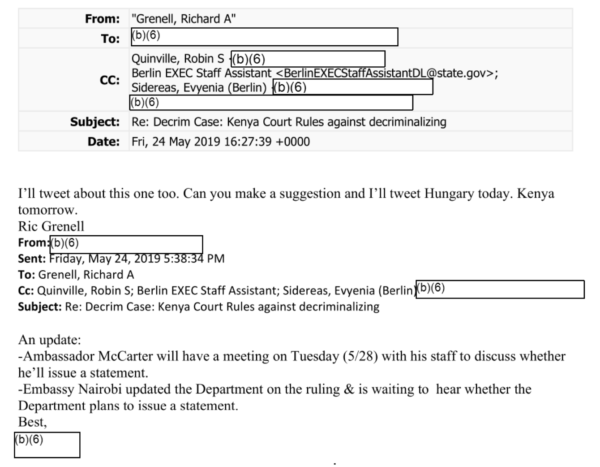
In terms of discussion at the U.S. embassy on the Kenya decision, whatever was considered apparently didn’t bear fruit. The Blade couldn’t immediately find any public statement on the Kenya decision from McCarter in his capacity as a U.S. ambassador during the Trump administration. McCarter didn’t respond to the Blade’s request to comment for this article.
In 2018, McCarter was grilled during his Senate confirmation hearing on his record as an Illinois state legislator who opposed LGBTQ rights, including his vote against an anti-bullying measure after stating he believed it would promote homosexuality. McCarter also had a history of misogynistic tweets and in 2016 tweeted: “Hillary for Prison. No, really.”
Much of the focus on the Trump administration’s global initiative appeared to be Iran, which has been an antagonist on the global stage and more so after Trump withdrew from the Iran deal. Iran is also one of the countries where homosexuality is not only criminalized, but punishable by death.
Although Grenell has publicly disputed Iran was the focus, he was quick to provide a quote to his assistant seeking a response from him after the country’s foreign minister affirmed its anti-gay policy in response to questions from a reporter with a German newspaper.
“The UN’s Declaration of Human Rights makes clear that these answers from the Iranian regime are violating basic UN principles,” Grenell writes. “UN members should agree with the Declaration in order to be members. Criminalizing homosexuality violates the Declaration, plain and simple.”
Grenell’s response was later found online in an article in The Jerusalem Post, which covered reaction to the news in an article titled, “Iran’s FM affirms right to execute gays and blasts U.S. and Israel.”
Virginia
Va. courts allow conversion therapy despite law banning it
Judge in June 30 ruling cited religious freedom.
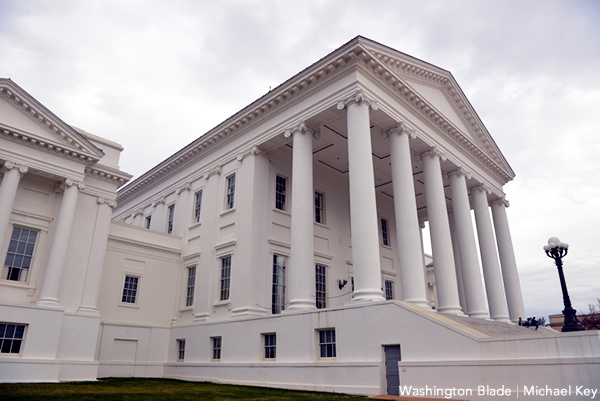
In 2020, the state of Virginia had banned the practice of conversion therapy, but on Monday, a county judge ruled the ban violates the Virginia Constitution and Religious Freedom Restoration Act, allowing the therapy to start once more.
The conversion therapy ban, which can be seen in Va. Code § 54.1-2409.5 and 18VAC115-20-130.14, was overturned on June 30 as a result of two Christian counselors who argued that their — and all Virginia parents’ — constitutional right to freedom of religion had been encroached upon when the state legislature passed the ban.
A Henrico County Circuit Court judge sided with John and Janet Raymond, two Christian counselors represented by the Founding Freedoms Law Center, a conservative organization founded in 2020 following Virginia’s conversion therapy ban. Virginia’s Office of the Attorney General entered a consent decree with FFLC, saying state officials will not discipline counselors who engage in talk conversion therapy.
Conversion therapy, as the legislation described it, is considered to be “any practice or treatment that seeks to change an individual’s sexual orientation or gender identity, including efforts to change behaviors or gender expressions or to eliminate or reduce sexual or romantic attractions or feelings toward individuals of the same gender.” The ban’s reversal will now allow parents to subject their children to these practices to make them align better with their religion.
This decision comes despite advice and concern from many medical and pediatric organizations — including the American Psychiatric Association, American Psychological Association, American Association for Marriage and Family Therapy, and the American Counseling Association, to name a few — all of which denounce conversion therapy as dangerous and harmful to those subjected to it.
The American Medical Association, the largest and only national association that convenes more than 190 state and specialty medical societies, says that “these techniques are the assumption that any non-heterosexual, non-cisgender identities are mental disorders, and that sexual orientation and gender identity can and should be changed. This assumption is not based on medical and scientific evidence,” with attached data indicating people subjected to conversion therapy are more likely to develop “significant long-term harm” as a result of the therapy.
The AMA goes as far as to say that they outright “oppose the use of reparative or conversion therapy for sexual orientation or gender identity.”
FFLC has a clear goal of promoting — if not requiring — conservative ideology under the guise of religious freedom in the Virginia General Assembly. On their website, the FFLC argues that some progressive policies passed by the Assembly, like that of freedom from conversion therapy, are a violation of some Virginians’ “God-given foundational freedoms.”
The FFLC has argued that when conservative notions are not abided by in state law — especially when it involves “God’s design for male and female, the nuclear family, and parental rights” — that the law violates Virginians’ religious freedom.
A statement on the FFLC’s website calls gender dysphoria among children a “contagion” and upholds “faith-based insights” from counselors as equal — in the eyes of the law — to those who use medical-based insights. This, once again, is despite overwhelming medical evidence that indicates conversion therapy is harmful.
One study showed that 77 percent of those who received “sexual orientation change efforts,” or conversion therapy, experienced “significant harm.” This harm includes depression, anxiety, lowered self-esteem, and internalized homophobia. In addition, the study found that young LGBTQ adults with high levels of parental or caregiver rejection are “8.4 times more likely to report having attempted suicide,” with another study finding that “nearly 30 percent of individuals who underwent SOCE reported suicidal attempts.”
Virginia Senate Majority Leader Scott Surovell, a Democrat representing Fairfax, said that the overturning of the ban on religious merit disregards the entire concept of having professionally licensed counselors.
“I have no problem if somebody wants to go look at religious counseling from their priest or their minister, their rabbi, their imam — that’s perfectly fine,” Surovell told the Virginia Mercury. “When somebody goes to get therapy from somebody licensed by the commonwealth of Virginia, there’s a different set of rules applied. You can’t just say whatever you want because you have a license. That’s why we have professional standards, that’s why we have statutes.”
Obituary
Longtime DC resident Thomas Walsh dies at 87
Pa. native’s husband was by his side when he passed away
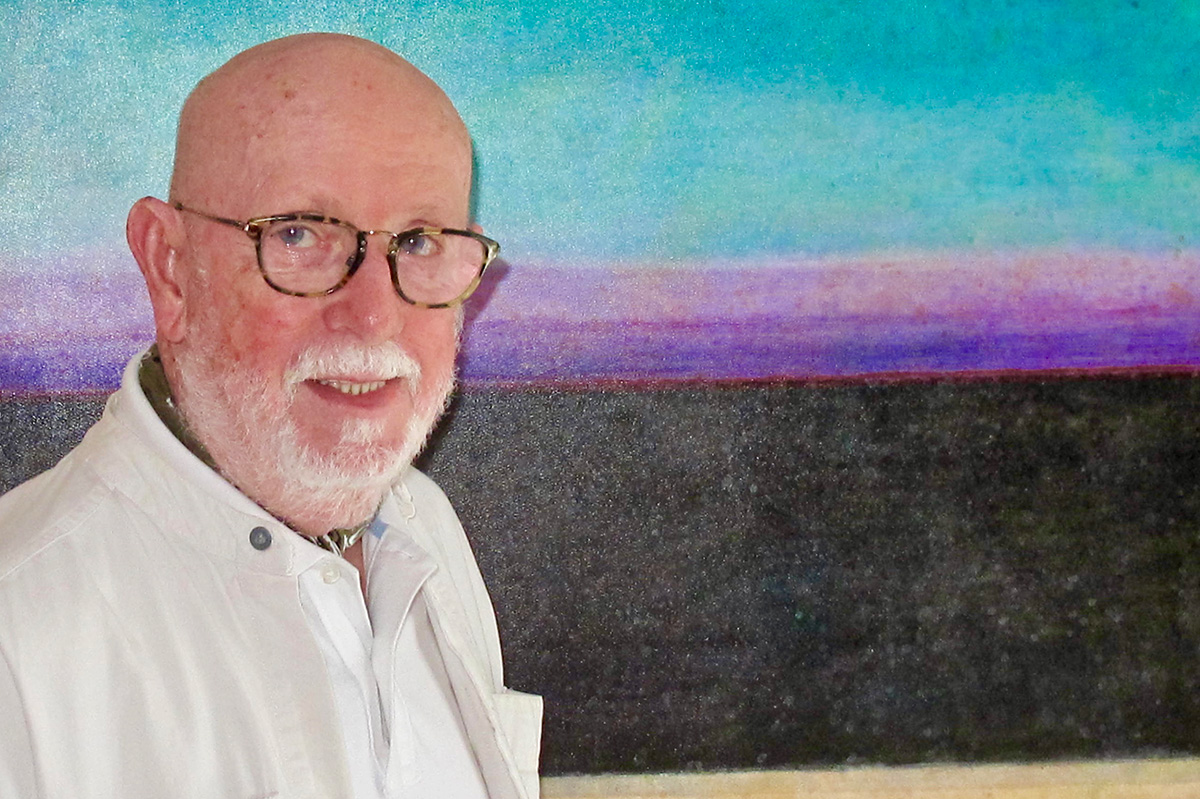
Long-time D.C. resident Thomas Walsh died on May 16. He was 87.
Walsh was born on Sept. 17, 1937, in Scranton, Pa. His family later moved to Levittown, Pa.
Walsh met his husband, Anthony Carcaldi, at the Blue Note, a gay bar in Asbury Park, N.J., in 1964.
“I walked in the bar with friends from New York City,” recalled Carcaldi. “I looked at the piano and this person was singing … and all I noticed were his blue eyes.”
Walsh was singing “Because of You.”
“I walked up to the piano while Tom was singing and stared at him, which caused him to forget the words,” said Carcaldi. “He composed himself and started from the beginning.”
Carcaldi and Walsh became a couple in 1965, a year after they met, when they moved to Philadelphia.
“We moved in together and have been together ever since,” said Carcaldi.
Walsh was a freelance graphic designer until he accepted a job in Temple University’s audiovisual department. Walsh and Carcaldi moved to D.C. in 1980.
Walsh began a graphic design business and counted Booz Allen as among his clients. Carcaldi said one of his husband’s “main loves was painting,” and became a fine artist in 2005.
Walsh showed his art at the Nevin Kelly Gallery on U Street, the Martha Spak Studio near the Wharf, and at the Wexler Gallery in Philadelphia. Walsh also sang with the Gay Men’s Chorus of Washington.
Walsh and Carcaldi married at D.C. City Hall in 2014.
“Tom and I have been together since 1964 until his death,” said Carcaldi. “Tom died peacefully with me at his side in bed on May 16, 2025, holding Tom in my arms as he made the transition out of life.”
A celebration of life will take place in September.
Congress
Ritchie Torres says he is unlikely to run for NY governor
One poll showed gay Democratic congressman nearly tied with Kathy Hochul

Gay Democratic Congressman Ritchie Torres of New York is unlikely to challenge New York Gov. Kathy Hochul (D) in the state’s next gubernatorial race, he said during an appearance Wednesday on MSNBC’s “Morning Joe.”
“I’m unlikely to run for governor,” he said. ““I feel like the assault that we’ve seen on the social safety net in the Bronx is so unprecedented. It’s so overwhelming that I’m going to keep my focus on Washington, D.C.”
Torres and Hochul were nearly tied in a poll this spring of likely Democratic voters in New York City, fueling speculation that the congressman might run. A Siena College poll, however, found Hochul leading with a wider margin.
Back in D.C., the congressman and his colleagues are unified in their opposition to President Donald Trump’s signature legislation, the “Big Beautiful Bill,” which heads back to the House after passing the Senate by one vote this week.
To pay for tax cuts that disproportionately advantage the ultra-wealthy and large corporations, the president and Congressional Republicans have proposed massive cuts to Medicaid and other social programs.
A provision in the Senate version of the bill that would have blocked the use of federal funds to reimburse medical care for transgender youth was blocked by the Senate Parliamentarian and ultimately struck from the legislation, reportedly after pressure from transgender U.S. Rep. Sarah McBride (D-Del.) and lesbian U.S. Sen. Tammy Baldwin (D-Wis.).
Torres on “Morning Joe” said, “The so-called Big Beautiful Bill represents a betrayal of the working people of America and nowhere more so than in the Bronx,” adding, “It’s going to destabilize every health care provider, every hospital.”



















